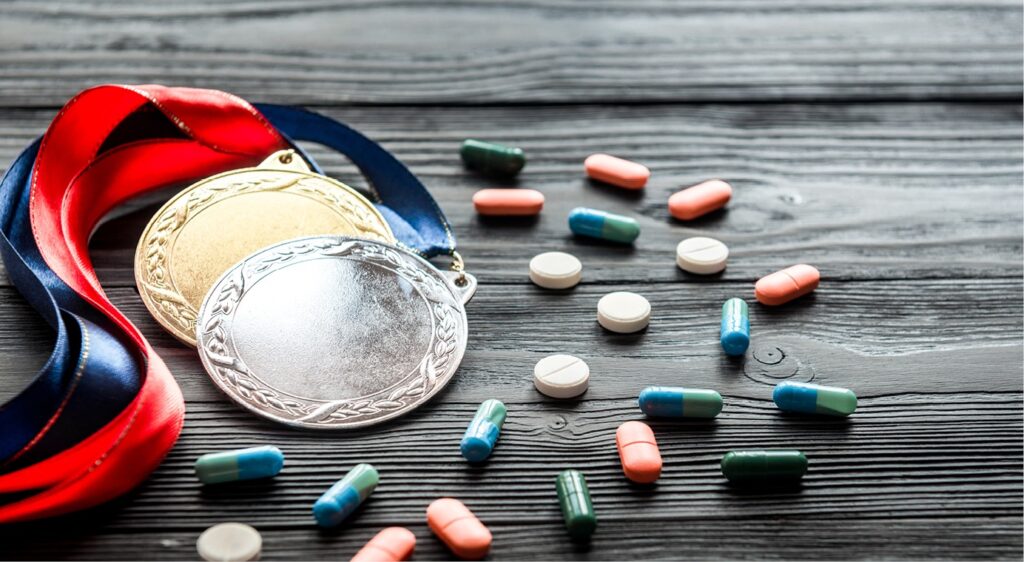
Eric Lira, a Texas native, will be the first person to be convicted under the United States of America’s revolutionary Rodchenkov Anti-Doping Act 2020, after he pleaded guilty before US Magistrate Judge Valerie Figueredo in Manhattan Federal Court. The 43-year-old Lira pled guilty to supplying drugs with prohibited substances to two athletes at the Tokyo Olympic Games in 2021.
“Lira, who claims to be a ‘kinesiologist and naturopathic’ doctor operating in and around El Paso, Texas, obtained unapproved versions of HGH and EPO, and other, prescription drugs from sources in Central and South America before bringing those drugs into the United States and distributing them to, among others, the two athletes referred to in the Indictment,” said the FBI.
One of the two athletes has been identified as Nigeria’s Blessing Okagbare, who was stopped from competing in Tokyo after she had won her first-round heat in 11.05 seconds. A Long Jump silver medallist at the 2008 Olympic Games, she tested positive for Human Growth Hormone (HGH).
The Athletics Integrity Unit (AIU) received the lab report of a sample collected on July 19, 2021, in Samorin, Slovakia, only after the first-round heats were complete in Tokyo. On August 20, 2021, Okagbare sought to explain the presence of HGH in her samples with a range of excuses – treatment for fever over three days, including an injection and pills, changes in menstrual cycle, thyroid medication, prenatal vitamins, supplements and consumption of contaminated food.
Curiously, only that day had she been notified of a positive test for EPO (recombinant erythropoietin) in a sample that had been collected on June 20, 2021. A week later, she wrote to the AIU saying she had no explanation for how EPO had entered her system, as she had not taken anything related to the substance.
On February 18, 2022, the AIU Disciplinary Tribunal banned Okagbare for 10 years, five for the use of multiple prohibited substances and five for her refusal to cooperate with the investigation. On June 23, 2022, the AIU slapped a further one-year ineligibility period for a whereabouts failure on June 13, 2021.
The charges in Lira’s case arose from an investigation of his scheme to provide athletes with banned substances, including HGH and erythropoietin. The work of the Federal Bureau of Investigation (FBI) and the FBI’s Integrity in Sports and Gaming Initiative has come in for praise, as has the support from the US Anti-Doping Agency and the Athletics Integrity Unit.
This news does take our thoughts to how different the anti-doping landscape would have been in India, had it also held such investigations and prosecuted traffickers.
Take the case of Pallavi Chandrakant Jagdale, a 20-year-old middle-and-long-distance runner based in Nashik. She told the National Anti-Doping Disciplinary Panel that a certain Rajesh, said to be a supplement supplier, had administered her an injection. No action has been initiated against Rajesh, who allegedly regularly injects athletes without being a medical practitioner.
It is not as if India did not envisage penal action against coaches and officials. The National Sports Ethics Commission Bill, 2016, was the first to propose a 10-year rigorous imprisonment term, a fine of Rs 10 lakh and a life ban for a doping violation. That Private Member’s Bill has not been passed by Parliament.
In 2017, the National Anti-Doping Agency held wide ranging consultations with stakeholders and drafted a National Anti-Doping Bill that contemplated jail terms for athletes and coaches, trainers and doctors, and others involved in the doping ecosystem. It changed its mind, dropping the criminalisation of doping activity, perhaps on advice from World Anti-Doping Agency (WADA).
Indeed, WADA told stakeholders to follow the WADA Code when sanctioning athletes, but to have laws to send banned traffickers to jail. Therefore, NADA must pursue cases against suppliers and coaches who are the reason for the spread of doping. It would be worth the trouble of a thorough investigation if even one trafficker was brought to book for spoiling the integrity of sport.
Indeed, it would be wonderful if the Central Bureau of Investigation can launch something like Operation Garuda, which cracked down on the illicit drug trafficking network and led to 127 cases, 175 arrests and the seizure of huge quantities of narcotic drugs in September last year. A well-planned operation against the doping nexus can help reduce the instances of violations.
In fact, the only time the CBI and doping have been spoken of in the same breath was when the Haryana Government referred Narsingh Yadav’s allegations, that his positive test was the result of sabotage, to the central agency. Nothing much has been heard of the Uttar Pradesh Police case after it raided the Herbal Power Pharmacy and arrested its owner in October 2021.
As recently as March, a team from German broadcaster, ARD, led by Hajo Seppelt, alleged in a documentary that a native of Denmark who resides in Mumbai illegally imports anabolic steroids into the European Union using his pharmaceutical company as a front. Nothing much was heard about India launching any investigation into such activity originating from the sub-continent.
Who knows? Perhaps, the Athletics Integrity Unit, Interpol and police in India are already working towards identifying organised doping networks and cracking down on them. We can but hope.



